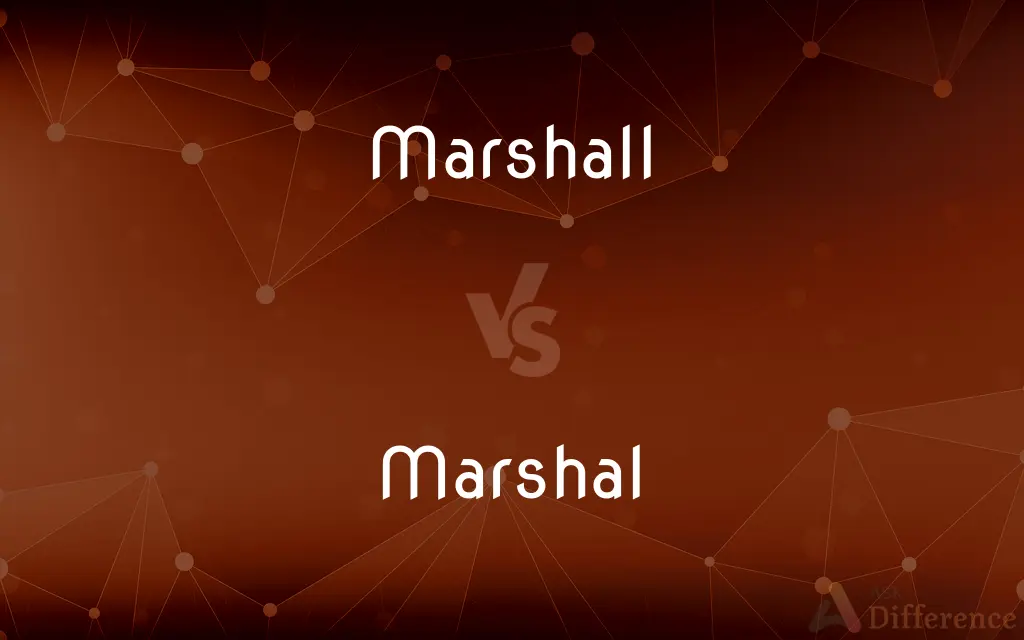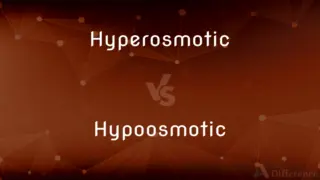Marshall vs. Marshal — What's the Difference?
By Tayyaba Rehman — Updated on August 21, 2023
Marshall is primarily a proper noun, often used as a surname or a given name. Marshal is a noun or verb related to organizing, leading, or serving as a law officer.

Difference Between Marshall and Marshal
Table of Contents
ADVERTISEMENT
Key Differences
Marshall, when used in the context of the English language, is typically seen as a proper noun. Many times, it is a surname like in the case of the U.S. Supreme Court Justice Thurgood Marshall. Additionally, Marshall can also be a given name, akin to names like Robert or William. On the other hand, marshal, with one "l", relates to roles and duties. It can signify a high-ranking officer in certain military traditions or the ceremonial leader in parades.
Marshal is also associated with law and order. In the U.S., a marshal can be a federal or municipal law officer responsible for security, prisoner transport, and similar duties. This term is reminiscent of the Old West, where marshals upheld law and order in towns. Contrarily, Marshall does not have a direct association with law enforcement roles. It might be used in titles, but not in the context of duty like the marshal does.
In terms of etymology, marshal comes from Old French "mareschal", which was tied to the care of horses. Historically, marshals were in charge of stables and horses. Marshall, as a name, might share this root but has evolved to be distinct in modern English. The meanings and usages of marshall and marshal have diverged over time, emphasizing their different connotations in the present-day language.
In the grammatical sense, marshal can function as both a noun and a verb. To "marshal" can mean to gather or organize resources, data, or people systematically. Marshall, however, remains largely a noun, particularly referring to a name or title.
Comparison Chart
Type
Proper noun
Noun/Verb
ADVERTISEMENT
Use
Surname/Given Name
Organizing/Leading/Law Officer
Etymology
Possibly from Old French "mareschal"
From Old French "mareschal" (related to horses)
Context
Titles or Names
Roles and Duties
Function in Grammar
Primarily a Noun
Both Noun and Verb
Compare with Definitions
Marshall
A brand or product name.
Marshal
A high-ranking officer in some military services.
The marshal led the troops into battle.
Marshall
A given name for males.
Marshall is celebrating his tenth birthday today.
Marshal
A law officer having duties similar to those of a sheriff.
The town marshal ensured safety during the annual parade.
Marshall
A law officer having duties similar to those of a sheriff in carrying out the judgments of a court of law
Marshal
To arrange or order in a desired sequence.
She worked hard to marshal her thoughts before the presentation.
Marshall
A surname of English origin.
Thurgood Marshall was an influential justice on the U.S. Supreme Court.
Marshal
Marshal is a term used in several official titles in various branches of society. As marshals became trusted members of the courts of Medieval Europe, the title grew in reputation.
Marshall
A name for towns, institutions, or places.
Marshall University is located in West Virginia.
Marshal
An officer of the highest rank in the armed forces of some countries
Marshal Tito
Marshall
(US) marshal
Marshal
A federal or municipal law-enforcement officer.
Marshall
Title for various high military or civil officials.
The Lord Marshall will attend the ceremony.
Marshal
A military officer of the highest rank in some countries.
Marshall
United States jurist; as chief justice of the Supreme Court he established the principles of United States constitutional law (1755-1835)
Marshal
A field marshal.
Marshall
United States actor (1914-1998)
Marshal
An officer of the courts of the United States who performs various duties such as protecting judges, transporting prisoners, and apprehending fugitives.
Marshall
United States general and statesman who as Secretary of State organized the European Recovery Program (1880-1959)
Marshal
A public official who performs various duties for the courts of a city, such as enforcing orders for money judgments or evictions.
Marshall
(in some countries) a military officer of highest rank
Marshal
The head of a police or fire department in the United States.
Marshal
A person in charge of a parade or ceremony.
Marshal
A high official in a royal court, especially one aiding the sovereign in military affairs.
Marshal
To arrange or place (troops, for example) in line for a parade, maneuver, or review.
Marshal
To arrange, place, or set in methodical order
Marshal facts in preparation for an exam.
Marshal
To enlist and organize
Trying to marshal public support.
Marshal
To guide ceremoniously; conduct or usher.
Marshal
To take up positions in a military formation.
Marshal
To take form or order
Facts marshaling as research progressed.
Marshal
(historical) A high-ranking officer in the household of a medieval prince or lord, who was originally in charge of the cavalry and later the military forces in general.
Marshal
A military officer of the highest rank in several countries, including France and the former Soviet Union; equivalent to a general of the army in the United States. See also field marshal.
Marshal
A person in charge of the ceremonial arrangement and management of a gathering.
Marshal
(US) A federal lawman.
Marshal
To arrange troops, etc. in line for inspection or a parade.
Marshal
(by extension) To arrange facts, etc. in some methodical order.
Marshal
To ceremoniously guide, conduct or usher.
Marshal
To gather data for transmission.
Marshal
To serialize an object into a marshalled state represented by a sequence of bytes that can later be converted back into an object with equivalent properties.
Marshal
Originally, an officer who had the care of horses; a groom.
Marshal
An officer of high rank, charged with the arrangement of ceremonies, the conduct of operations, or the like
Marshal
To dispose in order; to arrange in a suitable manner; as, to marshal troops or an army.
And marshaling the heroes of his nameAs, in their order, next to light they came.
Marshal
To direct, guide, or lead.
Thou marshalest me the way that I was going.
Marshal
To dispose in due order, as the different quarterings on an escutcheon, or the different crests when several belong to an achievement.
Marshal
A law officer having duties similar to those of a sheriff in carrying out the judgments of a court of law
Marshal
(in some countries) a military officer of highest rank
Marshal
Place in proper rank;
Marshal the troops
Marshal
Arrange in logical order;
Marshal facts or arguments
Marshal
Make ready for action or use;
Marshal resources
Marshal
Lead ceremoniously, as in a procession
Marshal
An officer of the highest rank in some royal households.
The marshal of the royal court announced the king's arrival.
Marshal
A person responsible for organizing or conducting certain ceremonies or processions.
The marshal ensured the parade proceeded without interruptions.
Marshal
An official responsible for supervising sports events, and for controlling crowds in other public events
Ground marshals joined the referee and touch judges in trying to regain order
Marshal
(in the UK) an official accompanying a judge on circuit to act as secretary and personal assistant.
Marshal
Assemble and arrange (a group of people, especially troops) in order
The general marshalled his troops
Marshal
Combine (coats of arms) to indicate marriage, descent, or the bearing of office
The quarters include those appearing on the Warwick Plate, but in addition there is marshalled that of Grey
Common Curiosities
What is the primary usage of marshall?
Marshall is mainly used as a proper noun, like a surname or given name.
How is marshal typically used in a sentence?
Marshal can be a noun denoting a high-ranking officer or a verb meaning to organize or lead.
Can marshall be used to describe a law officer?
No, marshal with one "l" is the term for a law officer, not marshall.
Is marshal related to military roles?
Yes, a marshal can be a high-ranking officer in certain military services.
What's the origin of the term marshal?
Marshal originates from Old French "mareschal", related to the care of horses.
Are there places named Marshall?
Yes, there are towns, institutions, or places named Marshall, like Marshall University.
How many "l"s does the name Marshall have?
The name Marshall has two "l"s.
Does marshall have any connection to law enforcement?
No, marshall is primarily a surname or given name, while marshal denotes a law officer.
Can both marshall and marshal be used as verbs?
No, only marshal (with one "l") can be used as a verb meaning to arrange or order.
Can marshal refer to a ceremonial role?
Yes, a marshal can be a person responsible for organizing or conducting ceremonies or processions.
Share Your Discovery

Previous Comparison
Nuptials vs. Wedding
Next Comparison
Hyperosmotic vs. HypoosmoticAuthor Spotlight
Written by
Tayyaba RehmanTayyaba Rehman is a distinguished writer, currently serving as a primary contributor to askdifference.com. As a researcher in semantics and etymology, Tayyaba's passion for the complexity of languages and their distinctions has found a perfect home on the platform. Tayyaba delves into the intricacies of language, distinguishing between commonly confused words and phrases, thereby providing clarity for readers worldwide.













































